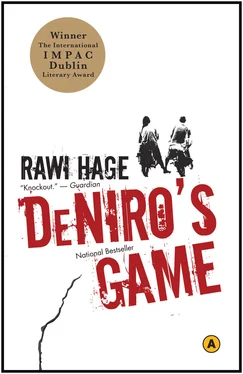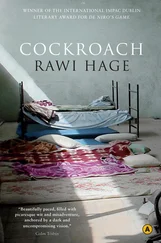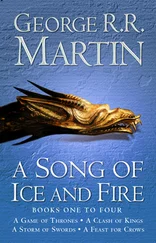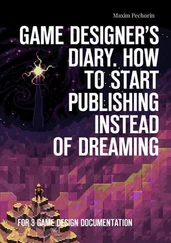She walked with me up the stairs to my room and stood at the door. Voilà , she said and kissed me on both cheeks. Then she bounced toward the stairs. On her way down, she paused and turned, smiled again, swung her hair, and said to me, You look good in my father’s clothes.
I TOOK OFF THE clothes and laid them on the back of a chair that was tucked under a small desk. It looked like a traveller’s desk, and I half-expected to see a Frenchman’s hand holding a single feather and dipping the feather in a small jar of ink to carry a few drops and transform them into a flow of graceful words on elaborate yellow paper, words starting with Ma Chère .
I glanced at the clothes resting on the chair and wondered if there was any significance in filling one dead man’s clothes with another.
I scrutinized the things in the room that seemed foreign to me: the handle that lifted the abat-jour , the small economical space that made the window look bigger. I lay down in the single bed next to the off-white, massive telephone that had no numbers to dial, nor rotary holes to jab your finger into. Then my curiosity took me to the bathroom, with its bidet, and tiny soap, and worn towels folded under a polite sign from the management. I stood above the toilet, undid my belt buckle, and slowly, urgently, I let the metamorphosed red wine burst and flow in the curve of a single yellow rainbow. Numbness took over my hands and my eyes and spread to my feet.
I looked out of the window and could not decide whether to go back into the streets or to lie on the bed. I opened my bag and pulled out the gun, some underwear that needed to be washed, and the wool pullover that my mother had woven for me. Every day for weeks, I remembered, she would ask me to turn my back to her, and she would paste the wool across my shoulders and run her hand along my spine, stretching the rag, ogling it from behind her myopic glasses. And she wove until she became the talk of every attic spider, every fisherman; she wove, and the wool flew to her from underneath shepherds’ noses, and landed in her lap. When my pullover was done, she wove canisters, tablecloths, TV covers. She wove until she covered our whole house and surrounded me with suffocating webs.
I GRABBED THE KEYS and my bag and decided to walk around the city. As I walked, I tried to remember how to find my way back to the hotel. I noticed that the streets were wider than those in Beirut, the building facades cleaner, and the cars almost never honked. I arrived at the bank of a canal and watched the drifting boats. I sat and compared what I saw to what I had imagined from the stories about Paris my history teacher, Mr. Davidian, had told us — stories of conquests, and orders, and rolling heads from the free-falling guillotine, and the short Corsican commander who rode magnificent horses and swept through countries, escaping in a small boat from the treacherous Englishmen and their austere queens.
I walked on, and lost myself in the crowds sitting in small cafés perched on the edge of the pavement. I walked for hours, and no one looked me in the eye, though I looked directly at every single person who crossed me. I even defied some of them with my fierce look; I challenged them to the slap of a white glove on the face, hoping for a duel with the weapon of my choice. I felt secure with the weight of my gun in my bag. If I had to, I could swing the gun in any alley, through all the glimmering light, in between the tiny cars.
Now that I wore the sweater my mother had woven for me, and had left my underwear soaking in the sink, I knew I could find my gun in a second. Now I could defend this city that looked so different from the old photographs in the history books. Now I could kill Nelson, the British admiral, and become a soldier in the emperor’s army. I would be the fastest shooter on a horse. I would slay priests, and hang aristocrats on trees filled with dangling biscuits. I imagined the operatic howling when I reached the palaces, imagined red-painted cheeks and fat asses under pumpkin-shaped dresses, imagined aristocrats sliding in horror and fear across endless marble floors. I listened, and contemplated the harpsichord sound of rushing sabres, the sound that would fill any revolutionary’s eyes with tears of triumph.
And so I drifted for hours, trying and failing to reconcile Paris with the phantasm of my youth, with the books I had read, with my teacher’s stories. And somehow, as if I had lived here once before, I traced my steps back from the sacked castles and through the glorious sites of rolling heads and falling wigs; I, a victorious soldier, returned to my small room with its small desk and scenic window view. I pulled my soaked underwear out of the sink and strangled it, and spread its wetness on the chair, over the desk, on the edge of the bed.
I did not wave a white cloth out of the window.
I slept.
WHEN I WOKE UP, I FELT STABLE, AS IF THE SEA HAD EVAPOrated and the rocking had ceased.
From my window I could see the balconies on the other side of the street, smudged by fog and made wet by the Parisian rain.
I searched for a cigarette, but found that my box had been emptied last night by the aristocrats I had executed, many of whom had requested one last cigarette.
I splashed water in my eyes, freed the last few drops of wine from my belly, took a shower, brushed my teeth, and rushed down the dark stairs. I walked toward the store, and bought a Gitane Mais that had no filter. I smoked while my soldiers pulled all the jewels from the corpses, wore the aristocrats’ wigs, mocked their feminine manners, frisked them for coins, bowed in front of their ladies’ cadavers, swooned under their hands, and pulled off their precious rings. Before the smell of rotting powdered cheeks rose, I ordered my soldiers to burn the corpses, and when the fire roared, I walked toward the flames and lit another cigarette.
MID-MORNING, the phone rang. It was Rhea. She asked me to come to the front desk.
I put on her father’s clothes and went down to meet her. When she saw me, she ran to me and kissed me for the third time since we had met. Let’s go, she said.
I followed where she led. Women are part of the revolution, I thought, and one has to take what they offer.
We walked and the rain drizzled; we took shelter in a small café. Inside, I was not the only one puffing revolutionary cigarettes. We made our way through a fog of clients with newspapers that flapped like wings, rustling, toward a small, round table in the back. I ordered a coffee and croissant, which tasted of thick milk and butter. Rhea smiled at me the whole time. She looked me in the eyes like no one else had dared to.
So, can I start asking you questions? She leaned toward me in a playful manner.
Sure you can.
Tell me about George.
But before I had the chance to open my mouth, she continued, You know, I am very excited at the idea of finding my brother. I always felt alone. My father travelled all the time, and my mother was always busy with her parties and her social engagements. He is more than a security guard, isn’t he? Is he really a fighter?
Yes.
Who is he fighting for?
He joined the Christian militia in East Beirut.
Tell me more.
I hesitated, not knowing where to start, or how to end. I decided to tell her stories about our school days: how George and I had always played together, about his house that was not too far from mine, about the day we crawled in the school garbage dump looking for copies of the French exam, and the day we broke into the church to steal the donation box, and the time we stole my father’s car keys and drove away. I told her about the days when we began to smoke in little alleys, and how, when the war started when we were still kids, we collected empty bullets and cannon shells that we polished with lime and exchanged for cigarettes.
Читать дальше












